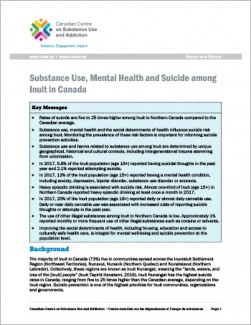Substance Use, Mental Health and Suicide among Inuit in Canada

The Canadian Centre on Substance Use and Addiction (CCSA) and Inuit Tapiriit Kanatami (ITK), the national organization representing Inuit across Canada, have summarized the latest statistics on substance use and mental health among Inuit in Substance Use, Mental Health and Suicide among Inuit in Canada. The statistics come from the full technical report, Risk and Protective Factors for Suicide among Inuit in Canada.
The new report sheds more light on the risk and protective factors for suicide among Inuit across Northern Canada. As Inuit have some of the highest suicide rates in Canada, with rates in some Inuit regions being 25 times higher than the Canadian average. The risk of suicide is elevated among Inuit because of intergenerational trauma from colonization, marginalization and the loss of the traditional Inuit lifestyle of harvesting and gathering food from the land.
The summary report reviews the risk factors for suicide among Inuit. These include mental and community distress, such as mental health conditions, substance use and socioeconomic inequities. Aligning with CCSA’s priority to address harms related to substance use, statistics on alcohol, cannabis and other substance use are also captured in the summary.
Substance Use, Mental Health and Suicide among Inuit in Canada underlines the importance of having an Inuit health survey governed and led by Inuit to ensure data reflect Inuit health and wellness accurately. The summary report also highlights the importance of public education efforts about safe alcohol and cannabis use.
Key recommendations include:
-
More research on the impacts of cannabis use on mental health and other health-related outcomes among Inuit.
-
Improving research and data collection on mental health, substance use and suicide among Inuit.
-
Improving the social determinants of health, including housing, education and access to culturally safe health care in Inuit communities.
-
Recognizing the importance of strengths-based approaches to limit stigmatization and inform programs that build on individual and community resilience.
It is expected that this report will be a resource for Inuit organizations, for people working in suicide prevention, and researchers and policy makers who work with suicide risk and the broader mental well-being of Inuit in Canada.